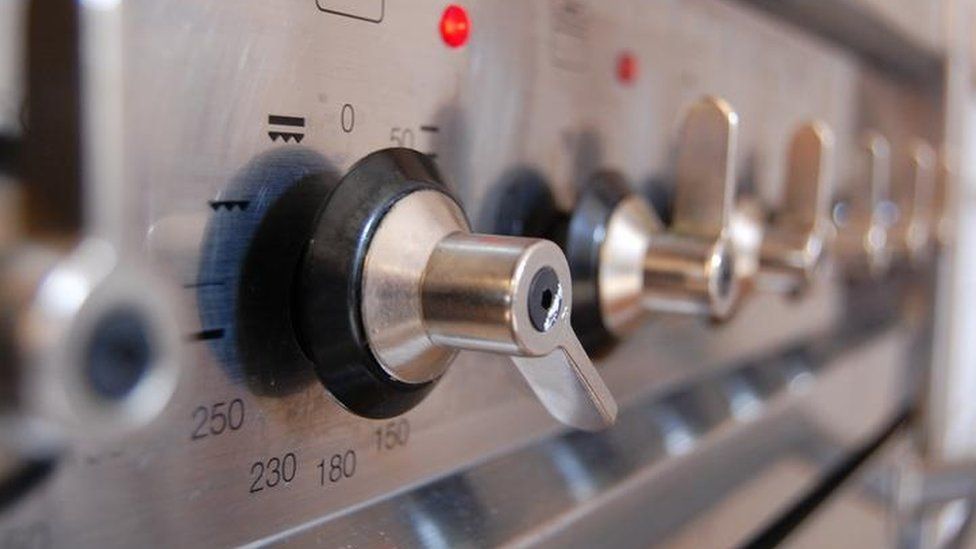Energy deal 'tease and squeeze' tactics
- Published

The extra costs faced by energy customers when a one-year deal comes to an end varies widely, analysis by one provider has revealed.
Prices rise when customers are moved onto a variable tariff at the end of a one-year deal, unless they switch.
This increase ranged from £275 to nearly £350 a year for the average household using one of the UK's major suppliers - known as the big six.
Extra charges from some smaller suppliers were £30 a year or less.
Prof Catherine Waddams, of Norwich Business School and an expert on energy pricing, expressed surprise at the size of the differences.
"Some companies depend on it much more than others, particularly the big six," she said.
However, it is not just the major suppliers, she added. "Some new entrants to the energy market are playing the same game in the sense that they also have a very high tariff onto which you default if you don't do anything at the end of your first year."
The analysis was conducted by Octopus Energy, a London-based newcomer to the energy market launched in April this year.
Greg Jackson, Octopus Energy's founder, told the BBC his company had a very different policy from the big six suppliers.
He described the business model that the large energy firms followed as "tease and squeeze".
"Energy companies, particularly the big six, but other companies as well, offer extremely attractive teaser prices - one-year fixed deals - and the consumer switches to that great deal thinking they are going to be saving a lot of money," Mr Jackson told the BBC's Money Box programme.
"But what the company will know and the customer doesn't necessarily know is that many customers are not going to switch away at the end of the year and they're going to ramp the price up and squeeze those customers."
The additional charges which squeeze non-switching customers arise because when customers do nothing after a one-year deal runs out, they are moved onto a company's Standard Variable Tariff (SVT).
SVTs vary from company to company and are rarely, if ever, marketed because they are almost always higher than one-year tariffs.
To examine how much price increases from one-year deals to SVTs vary between companies, Octopus Energy conducted an analysis of tariffs in the Eastern energy region - the largest in the UK.
They identified the best one-year fixed price deal each company offered during the past six months, and the latest SVT each company charged.
After 12 months, the analysis showed four of the top five deals were from the big six major suppliers.
But for those who do not switch after a year, the picture rapidly changes after their deals expire because customers then start paying at companies' SVT rates.
After 15 months - that is 12 months on the fixed deal and three months on an SVT - none of the big six suppliers provided the best overall deal. Instead the top five spots were occupied by five smaller suppliers: Octopus energy, GB energy, So Energy, Flow Energy and Places for People.
After 24 months - that is 12 months after failing to switch - Greg Jackson of Octopus said that the big six suppliers fell even further down the list.
Companies and regulators know what proportion of customers will end up on SVTs but when approached by the BBC neither would say - on grounds of commercial confidentiality.
Lawrence Slade from industry body Energy UK said: "I don't think it's in any companies interest…to have customers sitting on standard variable tariffs particularly disengaged customers….. for the very simple reason in a short while other companies will be able to market directly to your SVT customers."
But energy pricing expert Ms Waddams estimates around half of customers on one-year deals with the big six end up not switching and paying high SVTs, providing the companies with sizeable additional revenue.
"It might be 20% to 30% more," she told the BBC. "The company is certainly making a substantial amount of additional revenue."
Ms Waddams says the additional revenue stream enables the big six to offer cheaper one-year deals.
"They go further up the ladder in terms of the attractiveness of their current rate because they can subsidise it by those who aren't going to switch later. Companies that don't have a buffer of people prepared to pay a higher price and not really notice aren't able to offer such a good introductory offer because they're not playing that game."
Mr Jackson thinks energy regulators should require more transparency on price comparison websites about companies' SVTs. This is not part of regulator Ofgem's consultation on how energy deals are marketed.